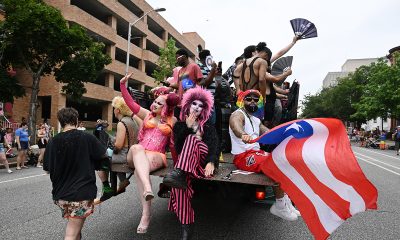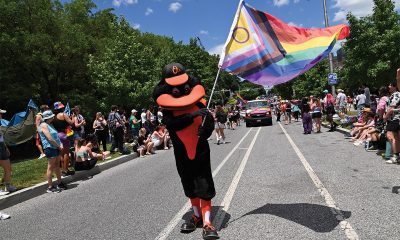Arts & Entertainment
East Coast extravaganzas
Philly’s Pride also this weekend, Baltimore next; others later in June
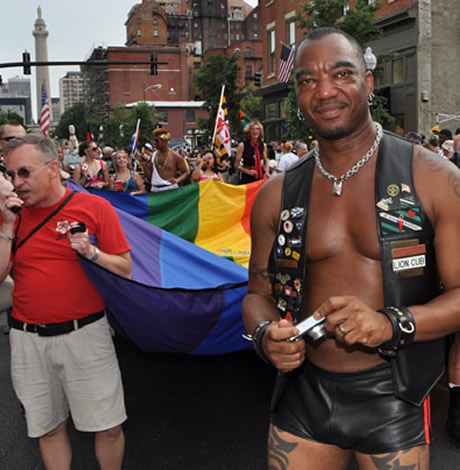
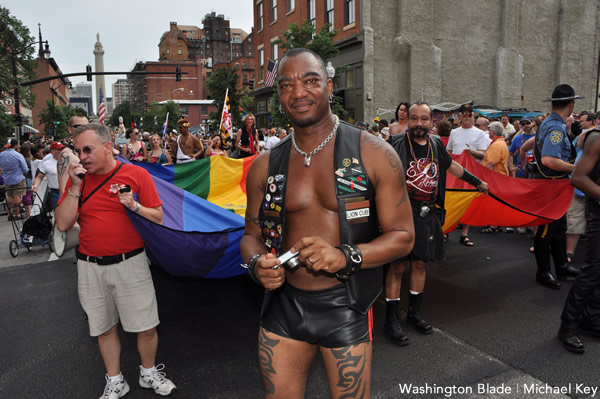
Baltimore Pride (Washington Blade photo by Michael Key)
The Baltimore Pride Celebration kicks off June 13 with “Twilight on the Terrace,” a cocktail party and fundraiser at Gertrude’s Restaurant at the Baltimore Museum of Art. The festival continues throughout the weekend, including a high heel race on Saturday and a block party on Sunday.
“We’ve expanded our footprint for Pride,” says Kelly Neel, interim executive director of the GLBT Community Center of Baltimore and Central Maryland, noting potential for a growing number of attendees.
Unlike previous years, this year’s Pride will feature entertainment and vending booths on both Saturday and Sunday instead of keeping those attractions separate from the parade, an adjustment Neel is looking forward to.
Baltimore Pride, which expects about 10,000 each day of the weekend-long celebration, will likely host a mass wedding this year, making a tradition out of a ceremony first held at last year’s Pride, the first year same-sex marriage was legal in the state.
Decades after the first Pride festivals were celebrated, Neel says there is still a place for them each summer, even as barriers fall for LGBT couples across the country.
“It’s great that there’s more awareness now and people are being more accepting of the LGBT community,” Neel says. “But I think that will just serve to make the parades bigger. Pride is not only a celebration of what’s going on in the now. It’s more a celebration of the past and a history of activism as well as the future.”
The city of brotherly love celebrates Philly Pride this weekend with a parade starting Sunday at noon from Philadelphia’s 13th and Locust streets. At this year’s pride — the first in Pennsylvania since same-sex marriage was legalized last month — the Hon. Dan Anders of the Philadelphia Court of Common Pleas will conduct marriage ceremonies at Independence Hall. Married couples will receive wristbands to the Pride festival.
The entertainment headliner is the Village People. Other Pride weekend events include a kick-off block party from 6-11 p.m. tonight on 12th Street between Walnut and Spruce, and the annual Dyke March on Saturday in Kahn Park at 3 p.m. For more details, visit phillypride.org.
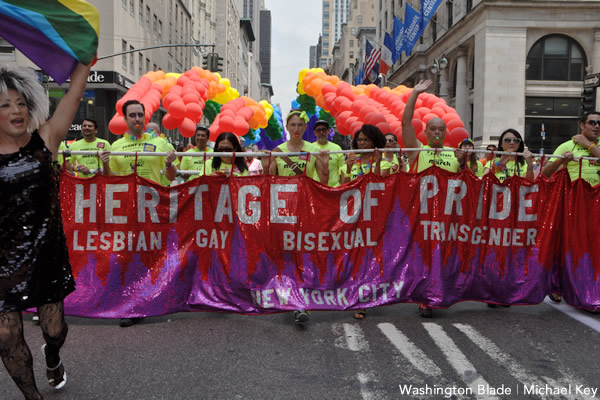
New York City Pride (Washington Blade photo by Michael Key)
The weeklong New York City Pride celebration starts June 24 this year, beginning with a family movie night featuring “The Wizard of Oz” at Hudson River Park’s Pier 46.
Other events include the rally on June 27, hosted by “RuPaul’s Drag Race” judge Michelle Visage and featuring performances from season four winner Sharon Needles as well as Betty Who, also set to play D.C. this weekend.
The centerpiece of the city’s Pride weekend is the New York Pride March, which steps off at noon. It begins at 36th St. and Fifth Ave., and ends at Christopher and Greenwich streets. What began as a 500-person “gay power” demonstration in June 1969 after the Stonewall Riots, has since grown into an annual civil rights celebration featuring 50 floats and more than 300 organizations.
This year’s Pride boasts big-name grand marshals: “Orange is the New Black” star Laverne Cox; lead actor in the hit HBO television series “Looking” Jonathan Groff; and Rea Carey, executive director of the National Gay and Lesbian Task Force.
Following the parade is Dance on the Pier from 4-10 p.m. on Hudson River Park Pier 26. All proceeds from this year’s dance, featuring a live performance from pop performer Demi Lovato, benefit the city’s official Pride events and LGBT community organizations. For more details on pride celebrations in New York City, visit nycpride.org.
Frederick’s third annual pride festival takes place June 28 from noon-6 p.m. in Carroll Creek Linear Park. Attractions include a pie eating contest, music performances, booths from local businesses, as well as an interfaith service at 11 a.m. the morning of Pride, a new addition this year. For more information, visit thefrederickcenter.org.
Chesapeake Pride festival kicks off later in the summer on Aug. 2 from noon-6 p.m at the Mayo Beach Park in Edgewater, Md. Head to the beach for “fun in the sun and a fabulous drag show,” Chesapeake Pride’s website says. Visit chesapeakepridefestival.org for details and updates.
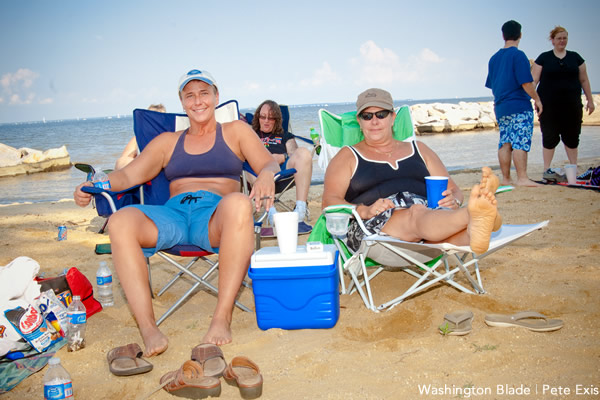
Chesapeake Pride (Washington Blade file photo by Pete Exis)
Out & About
Plan your wedding the LGBTQ way
Washington D.C. LGBTQ+ Wedding Expo scheduled for Sunday
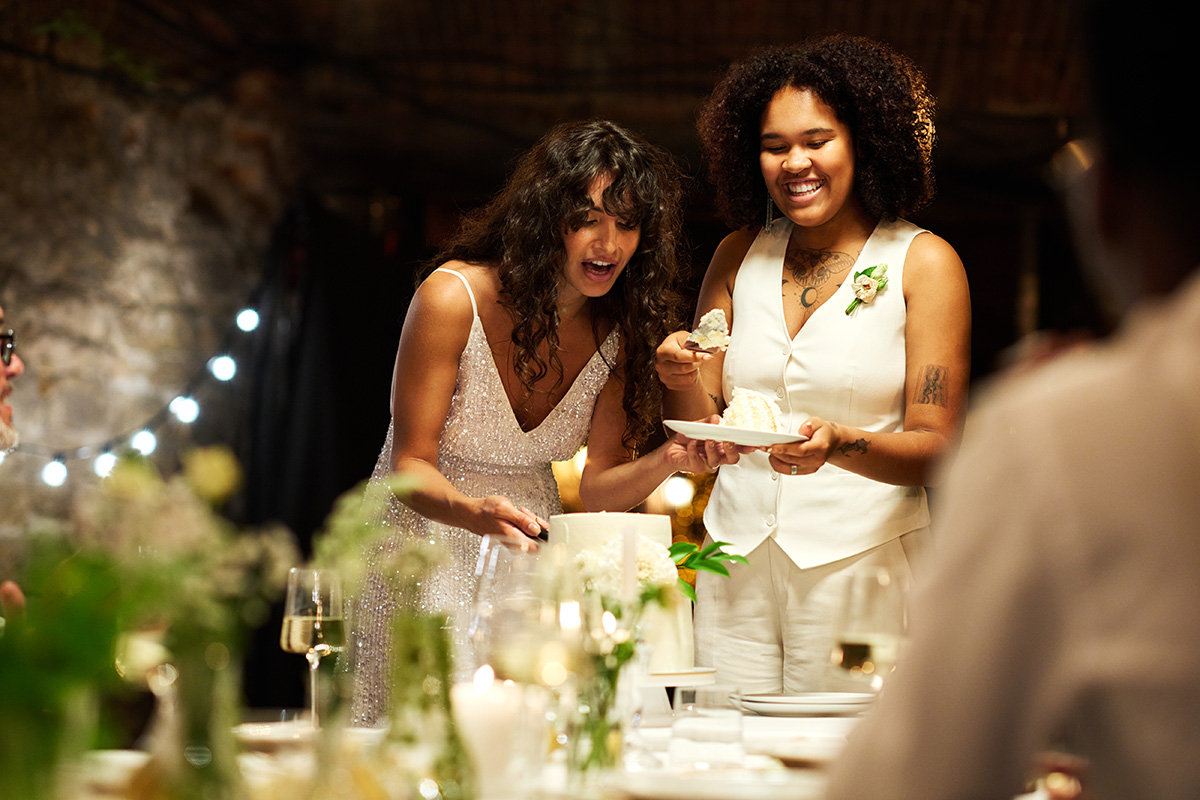
Rainbow Wedding Network will host “Washington D.C. LGBTQ+ Wedding Expo” on Sunday, March 1 at 12:30 p.m.
Guests can meet and mingle with a curated selection of LGBTQ-welcoming wedding professionals from across the region, each ready to help bring your vision to life, and spend a beautiful afternoon exploring everything they need to create a celebration that reflects them.
There will be a relaxed, self-guided look at the Watergate’s spaces and amenities, savor signature cocktails and delicious tasting samples, and connect with other couples who are on the same journey.
Visit Eventbrite to reserve a spot.
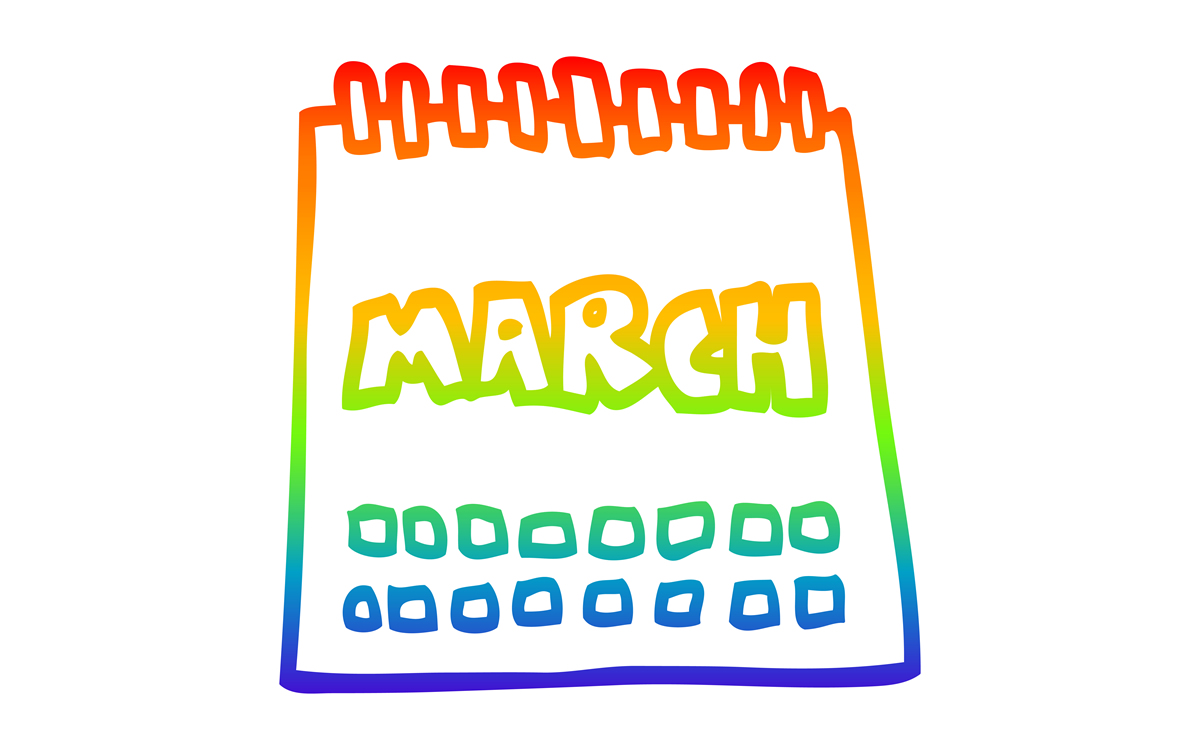
Friday, February 27
Center Aging Monthly Luncheon With Yoga and Drag Bingo will be at 12 p.m. at the DC Center for the LGBT Community. Email Mac at [email protected] if you require ASL interpreter assistance, have any dietary restrictions, or questions about this event.
Go Gay DC will host “LGBTQ+ Community Happy Hour Meetup” at 7 p.m. at Freddie’s Beach Bar and Restaurant. This is a chance to relax, make new friends, and enjoy happy hour specials at this classic retro venue. Attendance is free and more details are available on Eventbrite.
Trans Discussion Group will be at 7 p.m. on Zoom. This group is intended to provide an emotionally and physically safe space for trans people and those who may be questioning their gender identity/expression to join together in community and learn from one another. For more details, email [email protected].
Saturday, February 28
Go Gay DC will host “LGBTQ+ Community Brunch” at 11 a.m. at Freddie’s Beach Bar & Restaurant. This fun weekly event brings the DMV area LGBTQ+ community, including allies, together for delicious food and conversation. Attendance is free and more details are available on Eventbrite.
The DC Center for the LGBT Community will host “Sunday Supper on Saturday” at 2 p.m. It’s more than just an event; it’s an opportunity to step away from the busyness of life and invest in something meaningful, and enjoy delicious food, genuine laughter, and conversations that spark connection and inspiration. For more details, visit the Center’s website.
Black Lesbian Support Group will be at 1 p.m. on Zoom. This is a peer-led support group devoted to the joys and challenges of being a Black lesbian. You do not need to be a member of the Beta Kappa Chapter or the Beta Phi Omega Sorority in order to join, but they do ask that you either identify as a lesbian or are questioning that aspect of your identity.Send an email to [email protected] to receive the zoom link.
Sunday, March 1
LGBTQ+ Community Coffee and Conversation will be at 12 p.m. at As You Are. This event is for people looking to make more friends and meaningful connections in the LGBTQ community. Attendance is free and more details are available on Eventbrite.
Monday, March 2
“Center Aging: Monday Coffee Klatch” will be at 10 a.m. on Zoom. This is a social hour for older LGBTQ+ adults. Guests are encouraged to bring a beverage of choice. For more information, contact Adam ([email protected]).
Tuesday, March 3
Universal Pride Meeting will be at 7 p.m. on Zoom. This group seeks to support, educate, empower, and create change for people with disabilities. For more details, email [email protected].
Wednesday, March 4
Job Club will be at 6 p.m. on Zoom upon request. This is a weekly job support program to help job entrants and seekers, including the long-term unemployed, improve self-confidence, motivation, resilience and productivity for effective job searches and networking — allowing participants to move away from being merely “applicants” toward being “candidates.” For more information, email [email protected] or visit www.thedccenter.org/careers.
Center Aging Women’s Social and Discussion Group will be at 6 p.m. on Zoom. This group is a place where older LGBTQ+ women can meet and socialize with one another. There will be discussion, activities, and a chance for guests to share what they want future events to include. For more information, email [email protected].
Thursday, March 5
The DC Center’s Fresh Produce Program will be held all day at the DC Center for the LGBT Community. People will be informed on Wednesday at 5 p.m. if they are picked to receive a produce box. No proof of residency or income is required. For more information, email [email protected] or call 202-682-2245.
Virtual Yoga Class will be at 7 p.m. on Zoom. This free weekly class is a combination of yoga, breathwork and meditation that allows LGBTQ+ community members to continue their healing journey with somatic and mindfulness practices. For more details, visit the DC Center’s website.
a&e features
Transmission DC breathes new life into a storied sound space
A fresh home for boundary-pushing culture on H Street

Late last year, phoenix-style, a fresh home for boundary-pushing culture arose on the H Street corridor. Transmission DC – a queer, trans, and POC-owned, operated, and centered community-focused venue – powered on in the former home to the Rock & Roll Hotel (famously, not a hotel, but very much rock & roll). Transmission (1353 H St., N.E.) arrives secure in its mandate – or even birthright – to provide a place to celebrate creativity and music through a lens of inclusivity and respect.
Transmission’s team brings experience, but also representation. Owners/partners Kabir Khanna (who is also programming director), Katii B, Ellie McDyre, and Kelli Kerrigan together previously managed 618 productions, a venue in Chinatown, crafting “some of D.C.’s freakiest parties, raves, and mosh pits” they note.
They packed up operations last fall to a space curated specifically for D.C.’s underground music and culture scene, building their efforts in Chinatown to bring in more fans in queer and POC circles.
Transmission, Khanna points out, is built on DIY values. In the music scene, DIY means that promoters and organizers – often disconnected from the mainstream and part of marginalized communities – build shows and programs collaboratively, but independently from institutions, supporting each other as smaller, independent venues close. Here, Transmission aims to ensure that those putting together these underground inclusive shows have a more permanent and stable home, can have access to resources, and can provide more sustainable income to artists. “We’re trying to get more people to support and enjoy the music, and also give artists and organizers within the DIY community more structure and a larger cut,” says Khanna.
Khanna also notes that Transmission operates “under the principles of safety, inclusivity, and respect.” McDyre added that even at venues that claim inclusivity, that statement might not take place in practice. We’re “not just pitting up a rainbow flag,” says McDyre, but as some of the owners are trans and POC, audiences can see themselves reflected at the top.
Much like the DIY nature of the music community, the Transmission owners brought a DIY ethos to turning around their space.
In March 2020 – the height of COVID lockdowns – Rock & Roll Hotel suddenly shuttered, though not due to the pandemic; instead, the venue claimed that decreasing sales and increasing competition led to the closure. For 14 years, it was the central spot for cheap beer and lesser-known and celebrated acts. The space stood vacant for more than five years, until Transmission turned the power back on.
“When we got into the space, it was effectively abandoned for years,” says Khanna. “There was a ton of mold, and paint primer covering all surfaces. It was nearly falling apart.” Khanna noted that many music venues like this one, regardless of how well it was maintained, “get the shit kicked out of it,” given the nature of shows. The team called in mold removal contractors, ripped up most of the floorboards, and started fresh.
Transmission’s first floor is styled as a stripped-down black box: the better to take in the music. “It’s minimal on purpose to act as a canvas for set design and music,” without a specific aesthetic, says Khanna. Moving upstairs, the second floor has been opened up, removing some walls, and now has a larger dance area than the first floor. Beyond the first two performance levels, and a holdover from Rock & Roll Hotel, is the rooftop. Though without a stage, the rooftop space is filled with murals splashed across the walls, with a full bar. Transmission’s current capacity is 496, but the team is looking to grow that number. Transmission will also leverage the full kitchen that Rock & Roll Hotel operated, bringing in Third Hand Kitchen to offer a variety of food, including vegan and vegetarian options.
Khanna pointed out an upcoming show reflective of Transmission’s inclusive ethos: Black Techo Matters on Feb. 27. The event is set to be “a dynamic, collaborative night of underground electronic music celebrating Black History Month.” Khanna says that techno came from Black music origins, and this event will celebrate this genesis with a host of artists, including DJ Stingray 313, Carlos Souffront, and Femanyst.



